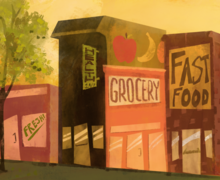Food bank starts program to feed hungry families over school breaks
Colleen Ferguson | Senior Staff Writer
Families were forced to stretch their monthly benefits after they received them early during the government shutdown.
The Food Bank of Central New York is preparing for an increase in hungry families to feed through its first-ever school break box program this week, after families had to stretch their February food benefits during the government shutdown.
Nearly 3 million people across the state receive Supplemental Nutrition Assistance Program benefits, according to the United States Department of Agriculture. New York state issued SNAP benefits early last month during the government shutdown, forcing families on benefits to stretch their monthly benefits longer.
A winter storm swept across the state the third week in January, just as February’s benefits were delivered and Syracuse-area schools will start winter recess this week. As a result, people could be going to grocery stores in larger numbers, resulting in food insecure families using their benefits earlier, Sherry Tomasky, public affairs director for Hunger Solutions New York, said.
“I believe that we have not even begun to see the impact of this SNAP crisis in New York state, and I don’t think that it’s going to manifest in a significant way until the last two to three weeks of February before those March benefits hit,” Tomasky said.
The Food Bank will provide extra food through the boxes, which are meant to meet the needs of children not getting school meals during that time off, Advocacy Resource Manager Becky Lare said. The boxes will be available to the Food Bank’s partner agencies.

Susie Teuscher | Digital Design Editor
More than 180,000 people in the greater Syracuse area are considered food insecure. Members of local hunger advocacy groups said the food insecure population in Syracuse, and beyond, will feel the effects of the shutdown for weeks to come.
Households will inevitably burn through their early benefit very quickly, Tomasky said. This will cause a ripple effect across the state for the rest of February, particularly in the next couple weeks, she said.
On average, throughout the Food Bank’s network, people reported that their benefits last them less than two and a half weeks, Lare said.
The early funds in New York weren’t a bonus or increased allotment for beneficiaries of the federal nutrition program. Instead, recipients got their food stamps two to four weeks before their usual arrival, Tomasky said.
Most food pantries provide people with enough food for three days, assuming each patron eats three meals a day, Lare said. Even with February’s food stamps and help from a pantry, this leaves people potentially turning to an emergency food network earlier than usual, given the circumstances, she added.
“We’re expecting February to be somewhat interesting in that aspect,” Lare said.
Last year, the Food Bank’s outreach team connected individuals and families in central and northern New York with more than 2.8 million SNAP meals, according to the organization’s website.
Temple Society of Concord, a food pantry open three Fridays a month, is one of few area pantries that allows people to come on a regular basis as opposed to limiting patrons to a certain number of times a month, Suzanne Wass, co-chair of Temple Society of Concord’s food pantry, said. Wass estimated that as many as 80 to 90 percent of the people using the pantry are also SNAP recipients.
The pantry primarily receives its food from the Food Bank, as well as some bread products from Panera Bread and Bruegger’s Bagels, Wass said. Temple Concord also has a reserve account at the Jewish Federation of Central New York, she added, which can be utilized if necessary to buy more food.
“It’ll be pretty much business as usual,” Wass said. “If we get more people coming, then we’ll give them food.”
Published on February 17, 2019 at 8:50 pm
Contact Colleen: cefergus@syr.edu | @ColleenEFergus2






